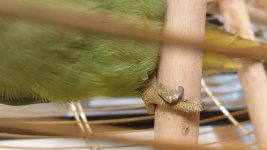rajatbhatia
New member
Hi all,
First, I'm very happy to see a forum specially for Parrot owners and amazed at the kind of contribution many are putting to help solve questions of people like me.
So, I recently got an IRN parrot from a local bird shop. The guy said its a Male and 7 months old. 'His' wings were clipped and he was coming onto the hands at the shop. So, I brought it home based on trust.
Now, Its been 3 days since we brought it home.
Day 1 - Aggressive behavior to anyone and specially when we tried to put hand inside the cage. Brought him out by catching him inside the page (something terrible, I realize now) and then he was ok to come on hand but didn't want to stay for more than 10 sec. He was exploring the home but was running away from us. When I tried to bring my hand for him to perch on he didn't want to come and I eventually got bitten bad twice. Eating and sleeping well though.
Day 2 - I read this forum and realized the mistake. So I gave him his space and gradually took minute steps to bring to a point where he became comfortable with my presence or my hand inside the cage.
Day 3 (Today) - He is accepting my hand inside the cage. I am patting him on his beak, upper body and he isn't biting. He is eating from my hand - apple, sunflower seeds. But still, he isn't ready to come to my hand once he is out. He runs away.
Questions:
- So I am happy with the progress but want to be sure that what I am doing is correct and if there is anything else I should do to make him more comfortable and receptive.
- That the parrot hasn't made a single sound. When do they start screeching or making basic sounds?
- Whether its a male or female? I wanted a male and I don't know why I am feeling cheated. I am posting few pics (face, eyes, front, feet) of my parrot and appreciate expert suggestions on age and gender.
First, I'm very happy to see a forum specially for Parrot owners and amazed at the kind of contribution many are putting to help solve questions of people like me.
So, I recently got an IRN parrot from a local bird shop. The guy said its a Male and 7 months old. 'His' wings were clipped and he was coming onto the hands at the shop. So, I brought it home based on trust.
Now, Its been 3 days since we brought it home.
Day 1 - Aggressive behavior to anyone and specially when we tried to put hand inside the cage. Brought him out by catching him inside the page (something terrible, I realize now) and then he was ok to come on hand but didn't want to stay for more than 10 sec. He was exploring the home but was running away from us. When I tried to bring my hand for him to perch on he didn't want to come and I eventually got bitten bad twice. Eating and sleeping well though.
Day 2 - I read this forum and realized the mistake. So I gave him his space and gradually took minute steps to bring to a point where he became comfortable with my presence or my hand inside the cage.
Day 3 (Today) - He is accepting my hand inside the cage. I am patting him on his beak, upper body and he isn't biting. He is eating from my hand - apple, sunflower seeds. But still, he isn't ready to come to my hand once he is out. He runs away.
Questions:
- So I am happy with the progress but want to be sure that what I am doing is correct and if there is anything else I should do to make him more comfortable and receptive.
- That the parrot hasn't made a single sound. When do they start screeching or making basic sounds?
- Whether its a male or female? I wanted a male and I don't know why I am feeling cheated. I am posting few pics (face, eyes, front, feet) of my parrot and appreciate expert suggestions on age and gender.




